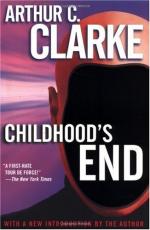|
This section contains 1,639 words (approx. 6 pages at 300 words per page) |

|
I would suggest that it is its elegant solution to the problem of progress that has rightly earned Childhood's End that "classic" status it now enjoys. (p. 211)
Clarke's myth of progress consists of two stages: that of rational, technological progress, and that of transcendent evolution. Many of his novels remain on the first stage and render technological speculations in painstaking detail…. But in his most far-reaching novels technological progress fails to satisfy, and mankind advances, not by inventing more competent machinery, but by mutating into a higher form of being. This transcendental vision offers, not the detailed ingenuity of mechanical invention, but powerful hints of modes of understanding and perception and of mental powers and controls that so completely surpass those which we ourselves experience that they are incomprehensible to us. Such a realm of being can only be hinted at; it needs a language of symbol and...
|
This section contains 1,639 words (approx. 6 pages at 300 words per page) |

|


